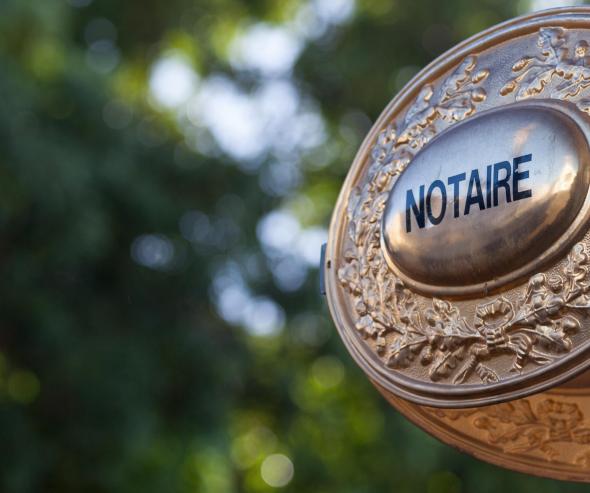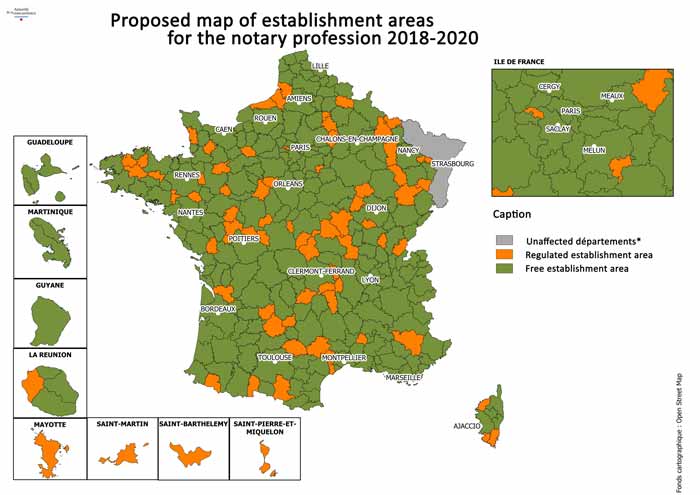31 July 2018: Freedom of establishment for notaries: proposed map for 2018-2020

The process of gradually opening up the notarial profession is producing encouraging results and must continue.
Pursuant to the “Macron Law”, the Autorité is making new recommendations to encourage the gradual establishment of new notaries.
The Autorité identifies 230 free establishment areas out of 306 areas in France and recommends the free establishment of 700 new notaries by 2020.
|
In accordance with Law 2015-990 of 6 August 2015 on Growth, Activity and Equal Economic Opportunities (“Macron Law”), the Autorité de la concurrence today proposed to the Ministers of Justice and the Economy a revised map of establishment areas for notaries, together with recommendations on the pace of creation of new notarial offices for 2018-2020. The law provides that this map be revised every two years. |
I- A SECOND STEP IN THE APPLICATION OF THE PROVISIONS OF THE “MACRON LAW”
1- The legislative and regulatory framework
Public and ministerial officials, notaries are appointed by the Minister of Justice to an existing, vacant or newly created office. The Macron Law introduced a principle of regulated freedom of establishment in order to lower barriers of entry to the profession and to adapt territorial coverage to the needs of the economy.
Within the framework of this system, the Autorité’s mission1 consists in proposing to the government, every two years, a map2 that identifies areas where the establishment of notaries is free (“green areas”)3 and areas where the establishment of notaries is regulated (“orange areas”)4.
The first map was proposed by the Autorité as part of Opinion 16-A-13 of 9 June 2016. Following its proposal, the joint decree of 16 September 2016 established 247 free establishment areas (out of a total of 307 areas) in which 1,650 new private notaries were to establish offices between September 2016 and September 2018.
2- State of supply and assessment of the creation of offices
Before formulating new recommendations for 2018-2020, the Autorité carried out an inventory of the supply and the location of notarial offices. As in its previous opinion, it notes:
• Strong territorial coverage in rural areas, but a shortage of supply in densely populated areas, which certainly have the most private notaries in absolute terms, but are below the median in terms of density (14.6 private notaries per 100,000 inhabitants); by carrying out a prospective evaluation of the effects of the creation of offices on the supply and establishment of notaries in the prudent hypothesis where, according to its recommendations, 1,650 new holders or partners would be appointed to offices created by the end of the validity of the first map, the Autorité anticipates an increase in the density of notaries (in 2018, the median will increase from 14.6 to 16.4 private notaries per establishment area).
• A high margin rate, even in the less dynamic areas: 80% of the offices have a margin rate higher than 19% and for 50% of the offices this rate exceeds 27%; on the basis of the same prospective evaluation, it forecasts a decrease in the average turnover per private notary (the median of the areas would be €550,000 in 2018, compared with €669,000 over the period 2012-2016).
• A greater heterogeneity in turnover and income in the area covered than in the average number of acts: there is thus a strong disparity between offices that are highly profitable, located in the green area, and offices that are less profitable, located in the orange area.
• The number of offices is up by 30% over the 2016-2018 period compared with 10 years of near stagnation
The Autorité noted that despite the cumbersome application and appointment procedure (manual drawing of lots, unlimited number of applications, lack of transparency, etc.), the number of offices increased by at least 30% over this period (that of private notaries by around 15%), whereas it had almost stagnated for a decade (+1.42% over the period 2005-2015).
• More choice for the client and better opportunities for qualified notaries
From a qualitative point of view, the arrival of new liberal professionals has a beneficial effect on the supply of notaries, with a greater choice for clients and closer proximity for the client and notary, as well as the creation of professional opportunities for qualified notaries who until now worked as salaried notaries or assistants, and who can now more easily access the liberal practice of their profession.
II - QUANTITATIVE RECOMMENDATIONS OF THE AUTORITÉ FOR 2018-2020: 700 NEW NOTARIES
Regarding its review of the map, the Autorité decided to renew the methodology used to draw up the first map, which had been validated in all points by the French Administrative Supreme Court (Conseil d’État) (decision of 16 October 2017).
By applying this method to updated data, particularly concerning turnover and professional staff, and by reasoning from the situation where, on the expiry date of the first map, the 1,650 appointments provided for by the decree of 16 September 2016 would be effective (protective approach), the Autorité estimates that the potential is between 1,800 and 2,300 new private notaries by 2024.
To reach this target, while complying with the law’s requirement for gradual implementation, the Autorité proceeded with linear growth for the recommendations between 2018 and 2024, which leads it to propose the creation of additional offices for the free establishment of 700 new notaries spread over 230 establishment areas (out of a total of 3066) in accordance with locally identified needs. The remainder of the recommendations not met during 2016-2018 must be added to the newly created offices.
In view of the above, the Autorité proposes the following revised map:

*In application of the exception provided for in paragraph VII of Article 52 of the Law of 6 August 2015.
III-THE AUTORITÉ’S QUALITATIVE RECOMMENDATIONS
As desired by the legislator, the Autorité is also making a series of recommendations to the government to ensure the success of the reform that are intended to:
1) provide for a transitional regime between two maps to ensure that any remaining appointments are made, even if the previous map has expired. It is proposed, for example, to annul the regulatory provision which provides that the adoption of a new map renders applications previously submitted by applicants null and void;
2) improve the appointment procedure in the orange area by introducing the principle by default to prohibit any creation of offices in these areas, except in exceptional situations which would justify, after an opinion of the Autorité, that the Minister of Justice waive this prohibition. Such an amendment to the current system would take into account that the government has chosen not to create any offices in the orange areas during 2016-2018 ;
3) improve the nomination procedure in the green area, in particular by limiting applications per area to one per natural person, setting a maximum number of areas for an applicant (e.g. three per day) and allowing candidates to express an order of preference between their different applications, as well as by organising an electronic and simultaneous drawing of lots in all areas, providing greater transparency on the application examination process, lengthening the maximum time between nomination and swearing-in and restricting the possibilities for late renunciation by candidates.
4) lower entry barriers for applicants for establishment by relaxing the rules on communication with clients by offices and on reduced tariffs.
5) improve the mapping process by involving the Autorité in the preparation of the report provided for in Article 52, paragraph VII, of the Law of 6 August 2015 on the advisability of extending the application of freedom of establishment to the departments of Bas-Rhin, Haut-Rhin and Moselle, by developing a framework for the systematic transmission of information to the Autorité and by imposing a breakdown of income and expenditure between the main office and its subsidiary office(s).
6) improve women’s and young people’s access to offices by extending to the notary profession the framework of Ordinance 2015-949 of 31 July 2015 on equal access for men and women within professional orders, making statistics available by gender, facilitating the link between the private and professional lives of notaries (“replacement notary” system during maternity or paternity leave), rapid adoption of budgetary measures to support the cross-sectoral fund for access to law and justice (responsible in particular for granting support for establishment in certain areas) and the integration of creative “young people” in the various bodies of the profession.
1Article L. 462-4-1 of the French Commercial Code and Article 52 of the Macron Law.
2 The areas concerned cover all the départements of Mainland France, except those of Bas-Rhin, Haut-Rhin and Moselle. It also includes the départements of Guadeloupe, French Guiana, Martinique, La Réunion and Mayotte as well as the French overseas collectivities of Saint-Barthélemy, Saint-Martin and Saint-Pierre-et-Miquelon.
3 In areas “where locating offices appears useful to improve proximity or the supply of services”, applications for establishment that meet the conditions laid down are likely to be accepted within the limit of the recommended rate of creation.
4 In areas where no need for creation has been identified, the Minister of Justice may refuse an application for appointment to a new office only if it is likely to “undermine the continuity of operations of existing offices and compromise the quality of service rendered”. The ministerial refusal shall state the reasons on which it is based. It comes after a public opinion by the Autorité de la concurrence.
5As the total number of establishments is expected to be less than 1,650, their actual impact will necessarily be lower than these estimates.
6Contrary to Opinion 16-A-13, Wallis and Futuna no longer constitutes an “establishment area” for the purposes of this opinion.
7With the exception of the creation of an office in Saint-Pierre-et-Miquelon in the specific context of a reform of the organisation of the notarial offices in this French overseas collectivity (Decree 2017-711 of 2 May 2017 relating to notarial offices in Saint-Pierre-et-Miquelon).
> To see the full text of the opinion, click here.
> To access the table establishing the number of new notaries by area.
> Press contact:
Chloé Duretête +33 1 55 04 10 20 / Email